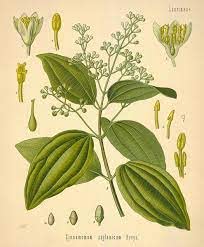A familiar flavouring of biscuits, puddings and cakes, cinnamon is one of the oldest known spices. The essential oil is potent, with a peppery, dry, spicy aroma - an excellent warming restorative oil for anyone feeling tired, cold and weak. It stimulates the mind and body and is effective in treating stress-related complaints.

Therapeutic uses
Cinnamon is an effective abdominal massage oil for relieving digestive spasms, constipation and diarrhoea. It also stimulates the circulation, especially to the extremities. A wonderful reviving room fragrance, it promotes a general sense of vitality and enthusiasm for life. The strong antiseptic properties of cinnamon make it a valuable room fumigant, protecting against infections and illnesses.
Active Ingredients of Cinnamon Oil
The chemical constituents of cinnamon oil include:
Phenols
up to 90% of cinnamon oil is made up of eugenol. Eugenol gives cinnamon its potent antiseptic, antibacterial activity. It is also responsible for its immune-boosting properties and uplifting, reviving effects.
Proanthocyanidins
This specialised group of bioflavonoids has powerful antioxidant effects and is also a great aid for stimulating blood circulation to the extremities.
Uses of Cinnamon Oil
Cinnamon is a highly valued medicinal herb with a wide range of therapeutic uses due to its stimulating, carminative and antiviral properties.
Soothe Aches and Pains
Cinnamon stimulates the circulation and brings warming relief to cold and tired muscles.
Warming foot spa

Bring warmth to cold feet with a circulation-boosting foot bath containing:
2 drops cinnamon oil
5 drops rosemary oil
Soak your feet in the warm blend for about 10 minutes.
Relaxing massage
Soothe tired muscles with a massage, using 25ml of grapeseed oil blended with:
1 drop cinnamon oil
3 drops ginger oil
6 drops marjoram oil
Massage the area briskly to stimulate circulation and flush away toxins.
The Folklore of Cinnamon
From ancient Egypt to Roma and China, cinnamon has long been used to decorate and purify temples. In the Book of Exodus, Moses was instructed to include cinnamon in the holy anointing oil. Pliny wrote that cinnamon was found in the nest of the legendary phoenix. The search for cinnamon and other spices was said to have been one of the reasons for the discovery of America.
Digestive Tonic
Warn the stomach and encourage a sluggish or painful digestive system with soothing cinnamon oil-based blends.
Stomach massage
For indigestion relief, massage the stomach with 25ml of carrier oil and:
2 drops cinnamon oil
6 drops mandarin oil
4 drops peppermint oil

Compress
To treat diarrhoea apply a warm compress across the abdomen containing:
2 drops cinnamon oil
6 drops ginger oil
3 drops sweet orange oil
Uplifting Room Fragrance
Combat mental fatigue and lethargy with stimulating cinnamon oil.
Boost circulation
Aid circulation using an essential oil burner or vaporiser and adding:
2 drops basil oil
2 drops cinnamon oil
5 drops lemon oil
Cinnamon and basil increase mental alertness and lemon gives a zesty boost.
Festive atmosphere
To introduce a festive winter room fragrance into your home, dilute the following blend in 200ml of water.
1 drop cinnamon oil
3 drops mandarin oil
6 drops pine oil
Then pour the blend into a spray bottle and diffuse the aroma.
Clear Infections
Cinnamon is a great weapon in the fight against a variety of germs and bugs that cause infections.
Antiviral vaporiser
Chase away colds and chest infections by adding to a vaporiser two drops each of cinnamon, tea tree and lemon oil. All three of these oils have powerful antiviral and antibacterial properties.
Foot massage
Strengthen your immune system by massaging the soles of the feet and 20ml carrier oil and:
1 drop cinnamon oil
2 drops eucalyptus oil
2 drops lemon oil
2 drops tea tree